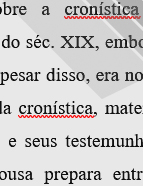

................................
This text, which supposedly dates back to the late 13th century, has thus become available, and in recent years has also given rise to a large body of literature, particularly in the production of the Seminário Medieval de Literatura, Pensamento e Sociedade [Medieval Seminar on Literature, Thought and Society], at the Universidade do Porto.
Maria do Rosário Ferreira, a philologist in charge of the organisation of a volume synthesising the advances around chronicle production in the afore-mentioned Seminário (2010), has emerged as one of the main agents in the study and dissemination of chronicle production in recent years. She was also in charge of the project "Pedro de Barcelos e a monarquia castelhano-leonesa [Pedro de Barcelos and the Castilian-Leonese monarchy]", which she not only studied and edited, but also disseminated the final unpublished section of the Crónica Geral de Espanha de 1344 [General Chronicle of 1344 Spain] until 2015. Knowledge of this text also received wide contributions, especially within the scope of the analysis of medieval Hispanic historiography, with particular emphasis on the developments of Inés Fernández-Ordóñez in the early decades of the 21st century. However, a complete edition of that chronicle is yet to be published in the version written by Count Pedro Afonso and left incomplete by Diego Catalán, as stated above. The main guidelines of chronicle production studies, with the exception of Fernão Lopes and his followers, would always remain closely linked to the text of 1344 and mostly to the philological perspective advanced by Cintra, which continues to enlighten historiographical work.
